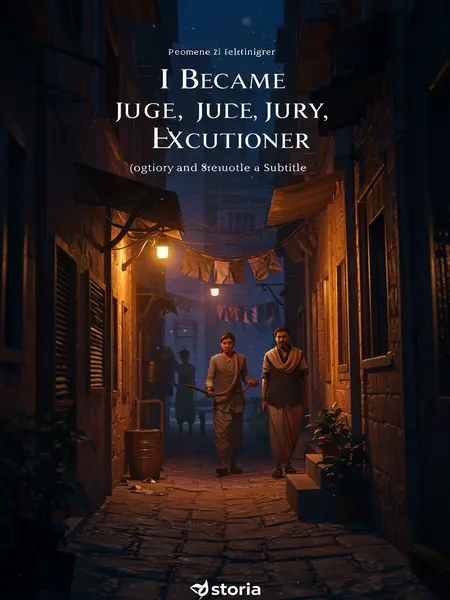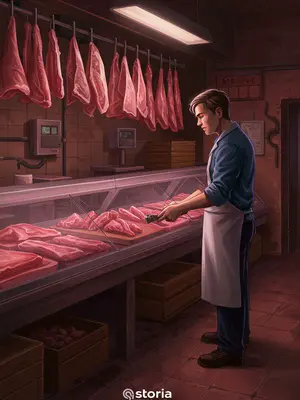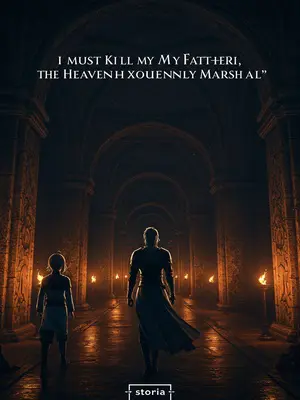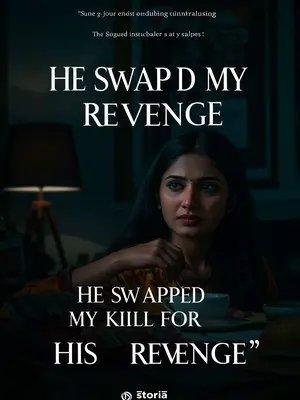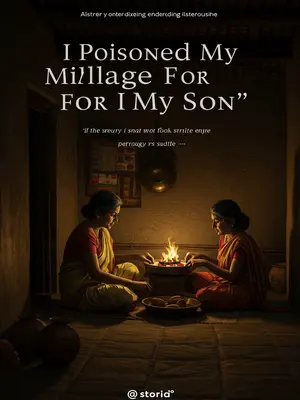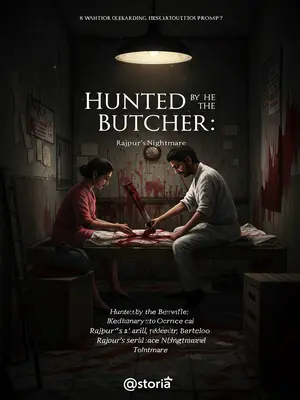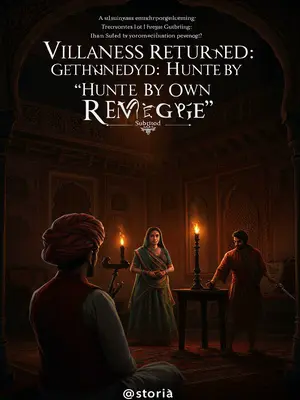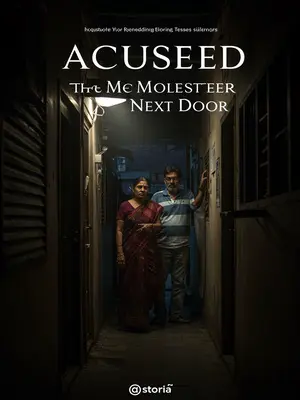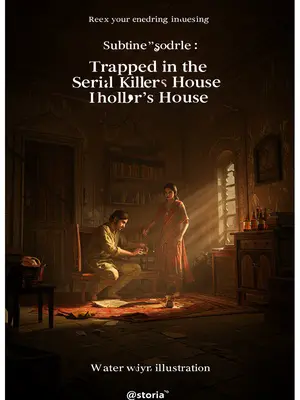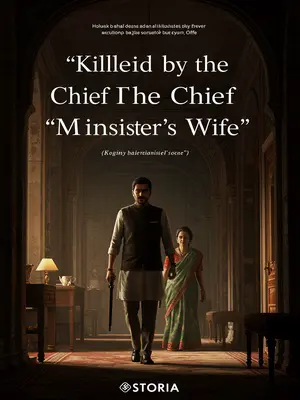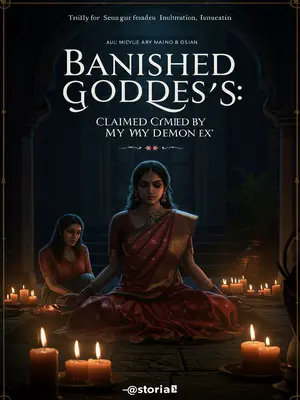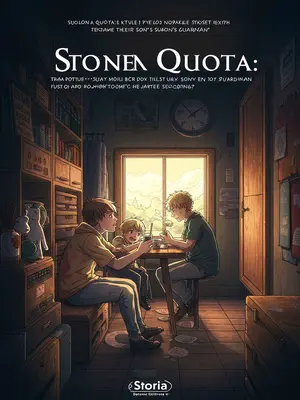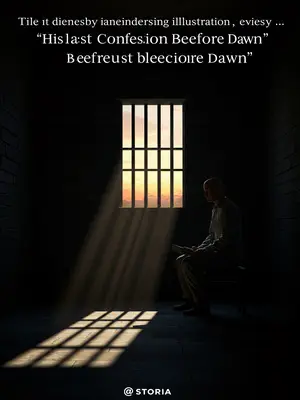Chapter 2: Retribution in the Black Café
Right now, I’m sitting in the black internet café above Fatty’s kirana shop.
The place stank of stale chips, sweat, and the ghost of a thousand cigarettes. Dim light flickered overhead, illuminating rows of battered computers, the walls sticky with cola spills and old movie posters. Below, Fatty bellowed at some delivery boy, the scent of fresh samosas wafting up the staircase. A half-eaten samosa oozed onto the mousepad, ignored as Fatty’s son tried to watch a pirated movie between customers.
This is where Professor Rohan was robbed.
Even now, you could see a dark stain by the doorway—the spot where Maggi splattered, burnt noodles crusted to the tile. The shop’s glass counter had a spiderweb crack, rumoured to have formed that night. People downstairs still whispered about it, but nobody dared clean it up.
Since returning, he often worked late, trying to solve the factory’s technical problems as quickly as possible. Whenever he got hungry, the factory manager would wake the canteen cook to make him a midnight snack.
Yet every time, Rohan sahib would insist, 'Don’t trouble anyone. I’m not a maharaja, I’m just doing my duty.' The cook’s wife, rolling out rotis late into the night, often complained—'Such a simple soul, but stubborn as a bullock!'
But Professor Rohan was considerate, not wanting to trouble anyone. So when he got hungry at midnight, he didn’t call for help. He’d come here himself, buy a bowl of Maggi, borrow hot water, and squat by the dusty roadside to eat before returning to work.
Neighbours would spot him, hunched near the open drain, quietly slurping noodles under the yellow streetlamp. The shopkeepers respected his humility, sometimes slipping him extra green chillies or a boiled egg. But still, he kept to himself, never wanting to disturb anyone’s sleep.
Amit was surfing the net here. When he saw Professor Rohan paying with cash, he got wicked ideas and poured boiling Maggi on him.
That night, the café was half-empty, save for a few loafers glued to their screens. Amit, his hair slicked back and shirt unbuttoned just so, watched with a predator’s eye. The moment cash flashed, greed overtook decency—and cruelty followed close behind.
This brat had just been released from the thana. He had no money for internet, so he lounged in his chair, arrogantly telling others how he beat up a middle-aged man.
His swagger was all show—feet on the table, shirt sleeves rolled up to display a cheap tattoo. He spun tales, cigarette dangling from his lips, basking in the half-hearted laughter of those even lazier than him. The room reeked of adolescent bravado and stale Frooti cartons.
The other loafers listened eagerly.
They leaned in, eyes wide, the glow from the monitors reflecting off their oily faces. For them, it was free entertainment, each story more lurid than the last. Even Fatty’s son, supposed to be at the cash counter, stood listening, his mouth agape.
They took no pride in studying, but thought being violent was something to show off about.
In a city where every parent dreams of IIT and IIM, these boys found glory in the gutter, measuring manhood in scars and police records. Their laughter was hollow, echoing off peeling paint and old ceiling fans.
Next to him was a girl who said proudly, "I was with my bhaiya at the time. I nearly died laughing. That uncle was so scared he was shaking, and he even tried to persuade my bhaiya that if he needed money, he should work instead of doing that. My bhaiya just slapped him—right on the Maggi—then dumped it on the uncle, who started crying and screaming, stripping in the street."
Her laugh wavered for a second, eyes darting to the floor before she found her bravado again. She wore a faded blue salwar and cheap plastic bangles, eyes rimmed with kohl. Her laughter was sharp, cutting through the musty air. She seemed to relish the memory, as if it gave her a twisted sense of belonging.
I frowned.
The sight of her pride—over such cruelty—gnawed at me. I felt a cold wave of disgust. My fingers drummed on the table, slow and deliberate, as I tried to make sense of the ugliness before me.
Amit is an only child. He can’t have a younger sister.
I recalled the names on the ration card, the silence of their house. My mind, sharp as ever, replayed every detail. No mistakes here; I was sure of it.
I know this for a fact—because while he was bragging in the internet café, I had already broken into his house and cut the tendons in his father’s hands and feet, crippling all four limbs.
The memory of that silent, blood-slicked room flickered in my mind: the dim bulb swaying, the heavy breathing of an old man reduced to whimpers. My hands shook, but my heart was steady. Some lessons only pain could teach.
His father lay in a pool of blood, wailing in agony, while I checked the ration card to confirm Amit was an only child.
The blue government booklet, worn at the edges, spelled it out clear as day. The kitchen clock ticked loudly, counting down the last moments of that man’s pride. I left the house with blood on my shoes and no guilt in my chest.
If a child isn’t taught, it’s the father’s fault.
This was the lesson my grandfather hammered into me—'As the tree, so the fruit.' I recalled the old man’s curses, shouted even through his pain. In our world, parents carried the weight of their children’s sins.
When Amit was taken to the police station, his father didn’t apologise. Instead, he cursed Professor Rohan, blaming him for calling the police, saying it could have been settled privately, but Professor Rohan insisted on pressing charges and got his son expelled.
The scene replayed in my mind: the father’s venomous words, the other men in the thana snickering at the spectacle. No remorse, only resentment. ‘Log kya kahenge?’ The only thing that mattered to him was face—not right or wrong.
Professor Rohan was the honoured guest jointly invited by our three hundred and fifty factories. To bully him is to insult the entire Singh family ancestral hall.
No one in Kaveripur would dare forget this. Even the old temple priest sent word, saying, 'Hamare gaon ki izzat hai, Rohan ji.' The insult was communal, not just personal—lines drawn, sides chosen.
As I wondered about the supposed little sister, Amit put his arm around the girl’s waist, kissed her ear, and asked, "Do you love your bhaiya?"
The gesture was bold, meant to provoke. The girl giggled, biting her lower lip, soaking up the attention. A couple of younger boys hooted, emboldened by the display of false bravado.
The girl rolled her eyes, but let him touch her waist, looking even prouder—as if being hugged by a big brother figure in front of everyone was a badge of honour.
She tossed her braid over her shoulder, chin up, daring anyone to challenge her place in the pecking order. For a moment, the café felt like a filmi set, with everyone playing to the gallery.
I understood: sworn siblings.
In our mohalla, such 'bhaichara' was common—alliances forged not by blood, but by the loneliness of growing up in broken homes and back lanes. Today’s rakhi was tomorrow’s heartbreak, but nobody seemed to care.
At this age, it’s common to randomly claim relatives.
All you needed was an exchange of sweets or an emotional promise—'From today, you’re my sister, samjhi?' For these kids, it was a shield against the world’s cruelty, even as they wielded their own.
Someone asked, "Didn’t the uncle get burned when you poured the Maggi on him?"
The boy’s voice cracked slightly, betraying a sliver of uncertainty. Even bravado had its limits; the image of real pain haunted the edges of their laughter.
Amit said, "He was lucky. He stripped fast, so he wasn’t burned, just turned red."
The others nodded, absorbing this detail like it was the punchline to a harmless prank. One boy even sniggered, mimicking the frantic undressing of an imaginary victim.
The girl sighed, "My bhaiya was lucky too. If the guy had been burned, my bhaiya wouldn’t have gotten out so quickly."
Her words floated out, thin and brittle. I caught the flicker of guilt in her eyes, gone in an instant, replaced by the easy confidence of youth that has never known consequences.
My heart ached.
A heaviness settled in my chest. The memory of Rohan sahib’s blistered hands, his forced smile through pain, made my own eyes sting. I pinched the bridge of my nose, fighting back anger and helplessness.
Because I know Professor Rohan was burned.
I remembered the raw, red skin, the doctor’s grim face, the hush in the hospital corridor as we waited for news. Even now, I could smell the antiseptic, hear the hiss of the oxygen cylinder.
When he was sent to the hospital, the doctor said the burns were extensive. We all urged him to get a medical injury assessment.
The family crowded the hallway, anxious, whispering, ‘File the report, don’t be soft, Rohan saab.’ Even the chowkidar at the gate muttered, 'Saab, ab toh limit ho gayi.'
But Professor Rohan refused. He reassured us, saying it was nothing, that young people are impulsive.
His words, soft but stubborn, echoed in my mind: 'Beta, let it go—maybe the boy will change. Why destroy a life for a moment’s mistake?' He wore kindness like armour, even as the world tried to pierce it.
Because he insisted on not seeking an injury assessment—wanting to give the boy a chance—Amit got out so easily.
Some called it mercy, others naivety. The police inspector shook his head, saying, ‘Aap toh Mahatma nikle, saab.’ My uncle grumbled all the way home, but Rohan sahib just smiled, bandages peeking from his cuffs.
But who could have guessed, the first thing Amit did after getting out was seek revenge on him.
Every time I remembered this, my fists clenched of their own accord. The city’s faith in second chances was shattered, and all because kindness was met with cruelty.
Now, Amit was still carelessly saying, "A few more days in lockup is nothing. If you haven’t been inside, you’re not really part of the scene."
His words oozed bravado, but the glint in his eye betrayed something emptier. The other kids looked up to him, hungry for any claim to rebellion or toughness—like filmi villains in the making.
Every time Amit talked about having "been inside," the students around him looked at him with a kind of admiration.
It was as if ‘jail’ was a badge of honour, a shortcut to manhood. The way they nodded, you’d think he’d won a medal, not lost his future.
As if he’d gone not to jail, but to IIT or Delhi University.
I almost laughed at the irony—these same boys who mocked toppers now wished for their own kind of fame, even if it came from darkness.
Someone else asked, "You hit an adult. Didn’t he fight back?"
There was a pause—a flicker of doubt, a tiny crack in their hero worship. Some looked away, uncomfortable with the idea that violence could be met with resistance.
Amit replied flatly, "No one has ever dared fight back when I hit them."
He straightened his back, voice cold and smug. It was an empty boast, built on the fear of those too gentle to hit back. A shiver ran down my spine—such confidence in cruelty, unchecked.
The girl laughed.
Her laughter was brittle, too loud. She clapped her hands, her bangles jangling, and the boys around her joined in, eager to be part of the fun.
She recounted, animated, "It was so funny. That uncle was naked but still wore glasses. My bhaiya slapped him again, knocking his glasses askew. He adjusted them, trembling, and said, ‘Beta, don’t do this, it’s not right.’"
Her voice rose in pitch as she acted out the trembling hands, the quiver in Professor Rohan’s voice. The group hung on her every word, faces split in cruel grins.
"Then my bhaiya slapped him again, knocking his glasses off. He held his face in pain. Guess what he said?"
She paused for effect, eyes sparkling with mischief. Even the usually silent boy in the back leaned forward, eager for the punchline.
A group of loafers clamoured, "What did he say?"
Their voices overlapped, anticipation turning their words into a babble. The whole café was suspended on the edge of her story.
The girl covered her mouth, giggling, "He just kept crying out, ‘Arrey!’"
The word hung in the air, familiar and yet shocking in this context. She mimicked the professor’s pain, her laughter ringing out like the call of a koel at dawn—sweet but jarring.
The internet café erupted in laughter.
Chairs scraped, hands slapped tabletops, and the ceiling fan rattled with the force of their hilarity. Even Fatty’s younger brother peeped in from the door, grinning at the commotion.
"Is there really someone who cries ‘Arrey’ when hit?"
A snort of disbelief cut through the laughter. Someone repeated the word, exaggerating it, making the others double over with laughter.
"I thought that only happened in movies! Hilarious."
They quoted lines from old Govinda films, imitating over-the-top acting. The air was thick with mockery, and for a moment, cruelty passed as comedy.
Listening to them, I touched the bloodstained dagger in my pocket.
My fingers curled around the hilt, cool and reassuring. Under the table, my knuckles whitened. The room’s laughter faded to a dull hum in my ears; all I could hear was my own heartbeat, steady as a tabla.
Is it funny?
I asked myself, again and again, knowing the answer but needing to feel the pain. My jaw tightened, every muscle wound tight as a bowstring.
Not at all.
No, not even a little. The injustice burned inside me, a fever that would not break. I looked around—no one else seemed to feel the wrongness of it all.
A returning professor, scalded with Maggi by a seventeen-year-old punk, stripped and slapped in the street, crying out in pain.
The picture flashed before my eyes, every detail vivid: his trembling hands, the torn kurta, the glint of tears in his eyes. In that moment, the world had turned its back on decency.
I don’t find it funny. It feels like a knife twisting in my heart.
The ache was so deep, it made my hands shake. My throat was thick with words I could not say, my eyes burning with unshed tears. In my country, to attack a guest was the greatest of sins.
Someone couldn’t help but say, "Bhaiya Amit, you hit someone and went to the thana. The teacher said you can’t go back to school. What will you do?"
The boy’s voice was tinged with concern, but also curiosity—how would their hero survive? The question hung in the air, heavy as monsoon clouds.
Amit shrugged, unconcerned. "Then I won’t study. I’ve already talked to a big brother. If I don’t study, I’ll work as a promoter at his bar. If I do well, I can make over a lakh a month."
He puffed out his chest, hoping to impress. A lakh a month sounded like a king’s ransom to these kids—never mind the road that led there.
The loafers’ eyes widened, not at the money, but in disbelief: "You really know people who work in bars?"
For them, bars were another world—mysterious, forbidden, glamorous. To know someone on the inside was to own a piece of that power.
Amit clicked his tongue, basking in their admiration.
He grinned, rolling the cigarette between his fingers, swagger returning. For a moment, he was king of the hill—every eye on him, every head nodding in awe.
I said nothing, lit a Classic Milds cigarette, then set it on the table and kept playing my game.
The smoke curled lazily upward, mingling with the stale air. My silence was deliberate—a challenge, a refusal to join their circus. My fingers danced over the keyboard, calm but ready.
The Classic Milds I left on the table soon caught Amit’s attention. Not just that—there were several thousand rupees in cash beneath the pack.
The sight of the crisp notes made his eyes light up, hunger flickering in their depths. The room’s energy shifted—a new target, a fresh test of his nerve.
I thought that, having just gotten out of the thana, Amit might restrain himself. I wasn’t sure if this bait would hook him.
My heart thumped in anticipation. Would he dare, or had jail taught him fear? The boys watched him, breath held, waiting to see what their leader would do.
But he hadn’t learned restraint.
Of course not. People like him never did. His pride was bigger than his sense.
He strode over, picked up the Classic Milds, and took one out.
He moved like he owned the place, fingers deft as a street magician. He looked right at me, challenging, lips curled in a half-smile.
When I looked at him, he glanced back arrogantly, bit the cigarette, and lit it.
The flame flickered, his eyes never leaving mine. He sucked in the smoke, exhaled slowly, daring me to react.
Soon he noticed the cash under the cigarettes.
His hand paused, thumb brushing the notes. The temptation was too much, and everyone in the room knew it.
I gripped the dagger in my pocket with one hand and reached toward him with the other.
The movement was slow, deliberate—a warning. The air crackled, the tension thick as malai on a cup of chai.
At that moment, he suddenly turned and called out to the others, "We’re fighting this afternoon. Who’s in?"
His voice rang out, breaking the spell. The boys sat up straighter, excitement replacing fear. The promise of violence was intoxicating.
Everyone’s attention shifted.
The room buzzed anew. Phones came out, WhatsApp groups fired up. The coming fight was already legend, even before a blow was struck.
I understood. He was hinting to me that he was about to call people for a fight, showing he was ruthless, and that taking my cigarette was giving me face, so I shouldn’t make trouble.
It was a classic move—assert dominance, dare the other to react. The rules of the street, played out in a dingy cyber café in Kaveripur.
Normally, people would hesitate in this situation.
Most would have backed off, let things slide. But today, the game had changed.
But these were just a bunch of loafers.
No plans, no strategy—just bravado and borrowed courage. They were as predictable as the power cuts in summer.
The girl put on a careless tone and asked, "Bhaiya, who are we fighting this time?"
She twirled her hair, voice light but eager. The thrill of the fight was a drug, and she wanted her share.
From her tone, it was clear she often fought alongside her sworn brother and felt proud of it.
For kids like her, violence was not a crime but a rite of passage—a way to prove loyalty, earn a name, carve out a place in this world.
Amit grinned, "That old guy from yesterday. He dared to call the police on me and got me kicked out of school. I won’t let him off. When the time comes, you all come with me—each of you slap him once. Dare to?"
He brandished the empty bottle like a trophy, eyes shining. The others whooped, each eager to show they had no fear.
My face turned cold.
Every word was a slap to my soul. I felt the old rage building, cold and sharp, a storm waiting to break.
I knew he was talking about Professor Rohan.
There was no doubt, no hesitation. The target was clear—and so was my purpose.
The group all pretended not to care, saying, "Let’s do it."
Their voices overlapped, false bravado hiding real uncertainty. Some grinned, some bit their lips, but none dared show doubt.
I sighed.
A long, tired breath escaped me. I felt older than my years, burdened by the weight of what must be done.
I stood up, walked to the café door, and locked it from the inside.
The metal bolt slid home with a heavy clack. Heads turned, surprise flickering across faces. The air thickened—danger was real now.
At first, I thought, the debt has a debtor. Today’s matter had nothing to do with these other brats, so I wouldn’t involve them.
My conscience whispered that only the guilty should pay. But justice is not always so clean.
But since they all intended to harm Professor Rohan, I wouldn’t let a nest of maggots go free.
The family code was clear: abettors are as guilty as the culprits. My resolve hardened, jaw set.
This black internet café was on the third floor, in a cramped room, with the main power controlled from downstairs.
The setting was perfect—no escape, no witnesses. I sized up the room, every detail etched in my mind.
In other words, these brats were now locked in by me, with nowhere to escape.
The finality of it settled over the room. Some shifted in their seats, unease creeping in as realisation dawned.
They didn’t notice what I’d done. Instead, they all took out their phones to call friends, excitedly saying, "We’re going to fight! You coming?"
The noise was deafening—shouts, laughter, the click of buttons. Oblivious to danger, they plotted their own undoing.
Even the girl was calling, proudly boasting, "Come with me this afternoon to beat up an old guy."
She puffed out her chest, voice rising. For her, this was a moment of triumph—a story to share with her own gang.
When she said "beat up," she emphasised it, as if she was about to do something glorious.
The words rang with false pride, a desperate need to belong. No one saw the darkness gathering.
Amit picked up my Classic Milds again, passed them out, and naturally pocketed the cash.
He moved quickly, fingers deft. Greed was second nature—he saw what he wanted and took it, without a second thought.
This guy had just gotten out of the thana, but hadn’t learned a thing.
The lesson had bounced off him, like rain off a buffalo’s back. His arrogance grew with every act of defiance.
Noticing my gaze, Amit looked uncomfortable and arrogantly asked, "What are you looking at, uncle? Not convinced?"
His voice was sharp, laced with challenge. The others watched, eyes darting between us, waiting for the spark.
I asked, "You’re robbing me, aren’t you?"
The question was calm, almost casual. But the steel in my tone was unmistakable.
Amit snorted impatiently.
He tossed his head, dismissing me with a sneer. 'Old fool,' his eyes seemed to say.
He said, "Yeah, I’m robbing you. What are you going to do about it? Pata hai kaun hoon main? Amit, No. 3 Inter College ka badshah."
He spoke as if his name alone was enough to end all arguments. The others nodded, emboldened by his defiance.
When he announced his name, he was full of pride, as if expecting fear.
He looked around, chin high, waiting for awe. But the only thing I felt was disgust.
But I just looked into his eyes and said softly, "Never heard of you. Just another nobody."
My words cut deep, sharper than any knife. The room went still, tension snapping like a stretched string.
In an instant, he got agitated, grabbed an empty Kingfisher bottle from under the table, and strode toward me.
The movement was sudden, reckless. The bottle glinted in the half-light, a crude weapon for a coward.
After all, there’s a kirana shop downstairs—plenty of snacks and drinks. Customers leave trash here all the time.
The clutter was the perfect camouflage for violence. No one would remember a missing bottle amid the chaos.
The other loafers didn’t stop him. Instead, they encouraged him, crowding around me.
Their faces were masks—some eager, some fearful, but all complicit. The pack mentality had taken hold.
Amit pressed the empty bottle to my head, putting on a big brother act, sneering, "When I smash this on your head, you’ll love it."
His words dripped with menace, but his hand trembled ever so slightly. The performance was for his audience as much as for me.
He turned to the others, "Tell them to come to the café now—we’re going to beat someone up."
The command was greeted with cheers, every boy eager to prove his loyalty. Phones buzzed, plans made.
The loafers all laughed, taking out their phones to call for backup.
Their laughter was forced now, nerves fraying at the edges. The anticipation of violence was a drug, but fear was beginning to seep in.
I took out my phone too.
The gesture was slow, deliberate. My thumb hovered over the screen, sending a silent message.
Amit thought I was calling for help. He pressed the bottle to my chest and said coldly, "Calling for backup? Let’s see who brings more people."
His words were hollow bravado. He had no idea who he was dealing with.
I glanced at him, didn’t call, but sent a voice message: "I’m at Fatty’s kirana shop."
The words were simple, but packed with meaning. The room tensed, as if sensing a shift in the wind.
He snatched my phone, but when he saw the message, he burst out laughing: "Hilarious, I thought you were calling for help. Look who he messaged."
He waved the phone like a trophy, ridiculing my choice. The others joined in, mocking the idea of calling family in a crisis.
The message was sent to my Chacha ji.
His name alone was enough to silence some, but not Amit. He tossed the phone back, grinning.
Amit laughed, "You’re this old and asking your Chacha ji for help when you’re about to get beaten up? Don’t tell me your Chacha ji is some gangster. How old is he?"
The taunts grew louder, the mockery more pointed. They had no idea the storm they’d just invited.
The loafers all laughed along.
Their laughter was hollow, tinged with uncertainty. Some glanced at the locked door, unease growing.
"Now you’re calling your Chacha ji. Are you going to call your parents next?"
A boy sniggered, nudging his friend. The room buzzed with the cheap thrill of bullying.
"So old and still calling your parents when you’re in trouble?"
Another joined in, piling on the ridicule. The mob was in full swing.
"Come on, call your mummy over to entertain us."
The words hung in the air, echoing the street’s worst cruelties. Even the girl giggled, emboldened by the pack.
"What gang does your Chacha ji belong to?"
I said quietly, "My Chacha ji is the chairman of the Singh family ancestral council."
My voice was soft, but every word was a thunderclap. The laughter faded, replaced by confusion.
Amit looked puzzled: "What? Which gang is that?"
He scratched his head, trying to make sense of it. The words meant nothing to him, but everything to me.
As soon as he finished, the power in the room went out.
Darkness swallowed the room, the hum of computers dying in an instant. The sudden silence was deafening. The only sound was the ceiling fan’s dying whirr, blades slowing as if even the air was holding its breath.
All the computers shut off at once. The sudden blackout stunned them.
Some cursed, others fumbled for their phones. The glow of screens was the only light, casting shadows on anxious faces.
The little delinquent girl muttered, "Why’d the power go out? Is it out everywhere?"
Her voice trembled, bravado slipping away. She shuffled to the window, peering out into the night.
She went to the window, looked out, and gasped, "What’s going on? The road outside is blocked."
Her gasp drew everyone to her side. The scene outside was surreal—a barricade worthy of a Bollywood climax.
Everyone crowded to the window.
The press of bodies, the collective intake of breath, the sudden fear—reality had arrived, uninvited.
On the road, four JCBs blocked the entrance, yellow tape strung up.
The machines stood like sentinels, unmoving. The tape fluttered in the humid breeze, a warning no one dared cross.
It looked like construction, but after parking the JCBs, the workers just walked away.
The message was clear: this was no ordinary roadwork. Even the police jeep, parked a block away, didn’t dare intervene.
With four JCBs blocking the road, even the police couldn’t drive in. Even a tow truck would be useless.
Panic flickered on a few faces. The realisation dawned—there would be no rescue, no escape.
While they stared outside, I kicked the table.
The crash was sudden, shocking. Wood splintered, monitors toppled, the pathway blocked in an instant.
The computers and table crashed to the floor, blocking the doorway—their only escape.
The thud echoed through the room. Dust rose in lazy spirals, catching the light of a single phone screen.
They were startled. Amit shouted, "Are you mad or what?"
His voice cracked, bravado gone. The others backed away, fear creeping in at the edges.
I asked, "What’s so funny about beating a good person?"
My question was sharp, slicing through the tension. No one answered. The room held its breath.
Someone cursed, "Pagal hai kya," and came up to me, saying, "What are you talking about?"
He tried to bluster, but his eyes darted nervously. The illusion of control was fading.
I said, "I’m asking you—what’s so funny about beating an honest, decent intellectual? If your parents can’t teach you, I can."
The words hung in the air, cold and final. A couple of boys shuffled back, unsure what to do.
He laughed.
But the laughter was forced, brittle. Even he knew the game had changed.
He shoved my chest and said, "Trying to scare me? Do you know who we are?"
His hand trembled, the bravado faltering. I didn’t flinch.
I shook my head, "No one cares about the names of society’s maggots."
The insult landed hard. A couple of boys gasped, others looked away, unwilling to meet my eyes.
As I spoke, I drew the dagger from my pocket.
The blade caught the weak light, glinting with promise. The room stilled, every breath held.
The blade, once stained with blood, was now wiped clean on my kurta, gleaming coldly.
I ran the edge along my thigh, cleaning away invisible stains, letting the memory of violence settle over me. The air was thick with fear.
Some were frightened. Some weren’t.
A few faces went pale, others tried to bluff, hiding their terror behind smirks.
Like the loafer in front of me.
He puffed out his chest, eyes narrowed. He thought himself invincible, king of this tiny world.
He sneered, "Oh, trying to scare us with a knife? Go ahead, I’ll let you stab me today."
He spoke with reckless bravado, but sweat beaded on his forehead. The others watched, silent, waiting for someone to blink.
He lowered his head, offering his skull, then pointed to his scalp: "Stab here. If you don’t, you’re my dog."
The challenge was a desperate attempt to save face. In another life, I might have laughed.
I laughed.
A short, harsh sound. The absurdity of it all made my anger sharper, not softer.
Loafers are amusing.
The world was full of such fools—brave until they met real danger. I almost pitied them.
I said, "First, daggers aren’t for stabbing heads. Second, the human skull is too hard. I won’t stab your head."
My voice was matter-of-fact, almost gentle. But the threat was clear as day.
Everyone thought I was chickening out and started laughing.
Nervous laughter bubbled up, a last gasp of denial. They didn’t realise what was coming.
The guy felt he’d shown enough bravado. He lifted his chin, pointed at my nose, and said, "I gave you a chance, but you’re useless. You—"
His words died on his lips as I moved.
Before he could finish, I moved.
A flash of motion—knee to the ground, hands on the table. Pain blossomed in his eyes, shock turning to terror.
I kicked his knee, making him kneel, hands on the table.
The thud was loud, final. His pride shattered with the bone.
I raised my knife and drove the blade straight through his palm, nailing it to the tabletop.
A scream tore through the room, primal and raw. Blood spattered across the table, soaking the old comic books lying there.
Screams echoed through the café.
The walls seemed to close in, amplifying the agony. Even the fan stopped spinning, stilled by fear.
Everyone was stunned. The once-arrogant loafer howled like a slaughtered goat.
The boy’s bravado vanished in an instant, replaced by desperate, animal panic. The others shrank back, eyes wide with horror.
I said coldly, "Daggers are for stabbing."
My words were icy, clinical. The lesson had begun.
Blood spurted from his hand. He clutched it in terror, but the bleeding wouldn’t stop. As blood poured between his fingers, his arrogance vanished, replaced by sobbing: "Bhai, I’m sorry, please calm down."
He whimpered, her kohl smudging down her cheek, the taste of old tears and new regret bitter in her mouth. One boy retched into a dustbin, another pressed his phone to his chest as if it could protect him. The group’s bravado collapsed, leaving only raw, shaking fear.
A half-grown loafer who bullied honest people, now showing a child’s fear before a real tough guy.
For a moment, I saw the scared child beneath the mask—a boy who had never known real consequences, until now.
I sighed, "Seems there’s nothing to prove you’re worth more than a maggot."
My voice was weary, almost sad. Mercy had no place here, not today.
I pulled the knife out. As I did, the blade sliced across his wrist, severing his tendon.
The motion was swift, precise. Blood arced in the air, a bright, terrible arc.
He convulsed, fell to the ground, clutching his ruined wrist, wailing.
His cries were muffled by the others’ gasps. The stench of fear filled the room, sharp as acid.
The whole place fell silent.
No one moved, no one spoke. Even the city outside seemed to hold its breath. Somewhere downstairs, a bhajan played on the radio, jarring in its innocence.
I walked toward them. The faces of these loafers were now filled only with terror.
Every step I took was measured, deliberate. Their bravado had evaporated, leaving only naked, pleading fear.
I asked, "Is it funny? Looking at your faces, I think it’s pretty funny too."
The words were cold, almost mocking. A few boys whimpered, shrinking from my gaze.
Amit still held the empty Kingfisher bottle, but now he couldn’t fight or run.
His hands shook, knuckles white on the glass. The bottle clinked softly against the table, his bravado leaking away like water.
Everyone panicked, pushing him forward, but after two steps, his legs buckled and he couldn’t even stand.
The group fractured, unity dissolving in fear. Each fought for their own survival, shoving the weakest ahead.
We were only on the third floor.
The window was an option, but the drop was steep. Death or humiliation—these were their only choices now.
For Amit, jumping out the window might have been his best option.
But pride chained him in place. He looked at me, defiant but broken.
But at this age, saving face is everything—especially in front of his followers.
I remembered my own youth—the weight of other people’s eyes, the pressure to never show fear. It had cost me, too.
I know that many young people pay the price in society because they can’t let go of their pride.
A lesson learned too late, by too many. My heart ached for all the wasted lives.
Amit tried to act composed, "Bhai, don’t be so impulsive. We were wrong too. Using a knife is pointless."
His voice trembled, the words a weak shield against reality. He tried to sound reasonable, but the fear in his eyes betrayed him.
I sneered.
My lip curled, contempt thick in my throat. He would not talk his way out of this.
He was talking tough, but clearly backing down.
The bravado was an empty shell, crumbling with every word.
Amit said, "Bhai, where are you from? I know a lot of big brothers. Maybe we’re on the same side."
He grasped at straws, hoping for mercy through shared connections. I shook my head, unmoved.
I replied calmly, "Singh family ancestral council."
My words fell like stones into a well, heavy and final. His eyes widened, understanding dawning at last.
He panicked: "I don’t get it. Never heard of that gang. You know Raju Bhai from No. 2 Inter College? Or the Thirteen Tigers of East Gate Bar?"
He babbled, voice rising, desperate to find some lifeline. The others looked at each other, hope fading fast.
I shook my head. "Enough nonsense. Come here. I’ll cut your hand and foot tendons—like I did to your dad—and this ends."
The room went dead silent. Even the girl stopped crying, eyes wide with horror.
Amit was stunned: "What about my dad?"
His voice was small, lost. The king of the café, reduced to a frightened boy.
I took a severed finger from my pocket and tossed it in front of him.
The finger landed with a dull thud, the gold ring gleaming in the gloom. The sight was more terrifying than any threat.
On the finger was a heavy gold ring engraved with the word ‘dhan’ (धन).
The engraving was clear, unmistakable. Every kid in the room recognised it—the mark of Amit’s father, once so proud.
It was Amit’s father’s finger.
The truth settled like a shroud. Even bravado could not hide the horror now.
In an instant, everyone but Amit turned pale, screaming in terror.
Some collapsed to the floor, others scrambled for the door, banging uselessly against the barricade. The café filled with the sound of panic, raw and unfiltered.
The delinquent girl stammered, "Bhai, he’s clearly here for you. Hurry!"
Her voice was thin, frantic. She backed away from Amit, fear overriding loyalty.
Amit turned and glared at her viciously.
His anger was useless now, powerless to save him. He spat a curse, voice cracking.
The girl panicked, "Bhai, only you can handle him!"
She wrung her hands, eyes darting between us, searching for any escape.
Amit slapped her, cursing, "Why don’t you go yourself?"
The slap echoed in the room, a last desperate act. She recoiled, tears streaming down her face.
She covered her face, stunned, staring at him.
The betrayal was complete. Her eyes were wide, full of hurt and disbelief.
Suddenly, she shouted, "I’m not your sister anymore! I’m leaving!"
Her voice was defiant, trembling with fear. She turned, pushing past the boys, desperate to escape.
She covered her face and tried to slip past me, but I grabbed her arm.
My grip was firm, unyielding. She sobbed, pleading for mercy.
She cried and pleaded, "Bhaiya, I didn’t offend you. If you want to hit someone, hit him. Let me go."
Her voice cracked, tears spilling down her cheeks. For the first time, the mask was gone—she was just a frightened child.
I asked, "When he robbed me, you just watched and laughed, didn’t you?"
The question was soft, but the accusation was heavy. She froze, guilt and terror mingling in her eyes.
She froze, unable to answer.
Her lips quivered, words failing her. She looked down, shame colouring her face.
I pressed the tip of my knife to her eye and said coldly, "Since you like to watch filth, you don’t need these eyes."
She whimpered, her kohl smudging down her cheek, the taste of old tears and new regret bitter in her mouth. In that instant, every cruelty, every laughter at another’s pain, was repaid in kind—the cycle of violence complete, the lesson written in blood and terror.
Outside, the first police siren wailed—too late, or just in time?
